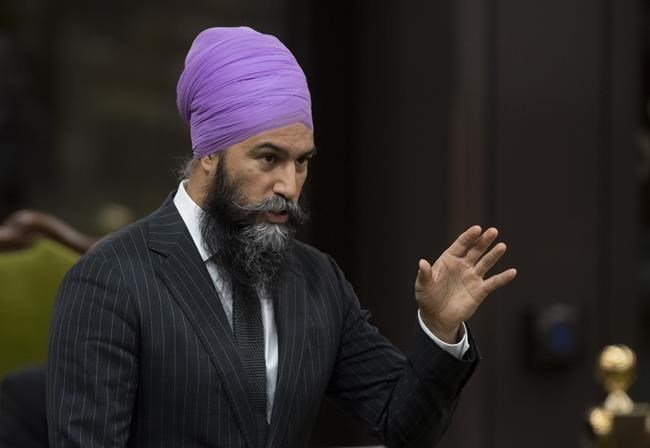OTTAWA — NDP Leader Jagmeet Singh is making a renewed push for the federal government to take concrete steps toward reconciliation with Indigenous Peoples, calling on Ottawa to drop a pair of Federal Court appeals he says represent a "belligerent" approach to justice for First Nations children.
The demand, in the form of an opposition day motion, comes as the country reels from the discovery of an unmarked grave holding what are believed to be the remains of 215 Indigenous children at a former residential school in Kamloops, B.C.
Singh said symbolic gestures are not sufficient and the moment demands action, accusing Prime Minister Justin Trudeau of hypocrisy in sympathizing with Indigenous communities while battling them in the courts.
“People are in horror," Singh said at a virtual news conference.
"It is not good enough to fly the flags at half mast. It is not good enough for the federal government to just express words of condolences, particularly when they are still fighting Indigenous kids in court."
The Liberal government is appealing a Canadian Human Rights Tribunal ruling ordering Ottawa to pay $40,000 each to some 50,000 First Nations children separated from their families by a chronically underfunded child-welfare system.
It is also fighting a tribunal decision that widened the applicability of Jordan's Principle, a rule stating that when governments disagree about who's responsible for providing services to First Nations children, they must help a child in need first and argue over the bills later.
Trudeau suggested Monday that compensation should be proportional to the trauma.
"Should someone who went to a day school for a few months or a year be compensated to the exact same amount as someone who was in a traumatic situation over many, many years, where they were taken from their families and had a very, very different experience?" he asked.
"Right now, the human rights tribunal says everyone should get exactly the same amount. We don't know that that's entirely fair."
Singh directly challenged that view: "How callous that sounds, that the prime minister is talking about levels of trauma.
"How do you gauge trauma?" he asked, saying length of time is a narrow yardstick by which to measure experience.
Cindy Blackstock, executive director of the First Nations Child and Family Caring Society, reiterated her years-long call for adequate child-welfare funding and a "fully" implemented Jordan's Principle — named in memory of a five-year-old boy who died in hospital in 2005 as the federal and provincial governments disputed who was financially responsible for his home care.
“The 215 little souls in Tk'emlups, I think they were sent to us at this time for a special reason: to remind us that residential school survivors … told their stories so that their children and grandchildren would not have to continue that injustice," she said at the news conference with Singh.
The government is in confidential talks with First Nations communities to work through that question, Trudeau said earlier this week. He added that "an awful lot" of work remains before reconciliation can be achieved, stating that residential school survivors need more support amid profound intergenerational trauma.
Singh is also asking the government for faster implementation of the Truth and Reconciliation Commission's calls to action, trauma resources for survivors and a progress report to be tabled in 10 days.
He said all opposition parties have indicated support for the NDP motion, but has yet to receive word from the Liberals. A vote is expected Monday.
The motion comes on the same day retired senator Murray Sinclair, who chaired the Truth and Reconciliation Commission, called for an independent investigation to examine all burial sites near former residential schools.
He told a House of Commons committee Thursday that such a probe should not be run by Ottawa, but should be overseen by a parliamentary committee that will ensure it is done properly.
Separately, the federal government committed to funding and co-developing targeted programs to address systemic barriers identified by a national inquiry into Indigenous women who have disappeared or been killed in Canada, which completed its work two years ago.
As part of Thursday's release of the action plan on the National Inquiry into Missing and Murdered Indigenous Women and Girls, a "federal pathway" document outlined Ottawa's planned steps to address the inquiry's sweeping 231 calls to justice.
In November, the human rights tribunal ruled that Jordan's Principle applies to children who live off reserves if they identify as members of a particular First Nation and that nation claims them — even if they don't have status under the Indian Act — and to children of parents who could legally get status but do not have it.
Effectively, it allows First Nations to decide whether a particular child is entitled to federally funded services, not just the federal government under the Indian Act.
Ottawa announced in December it would seek a judicial review of the decision.
The Indian Residential Schools Resolution Health Support Program has a hotline to help residential school survivors and their relatives suffering with trauma invoked by the recall of past abuse. The number is 1-866-925-4419.
This report by The Canadian Press was first published June 3, 2021.
— With files from Maan Alhmidi and Teresa Wright
Christopher Reynolds, The Canadian Press




